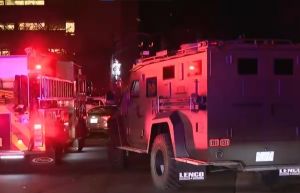The Ebola epidemic in West Africa could infect over 20,000 people and spread to more countries, the U.N. health agency said on Thursday, warning that an international effort costing almost half a billion dollars is needed to overcome the outbreak, according to The Associated Press.
The World Health Organization announced a $490 million strategic plan to contain the epidemic over the next nine months, saying it was based on a projection that the virus could spread to 10 further countries beyond the four now affected, including Guinea, Liberia, Sierra Leone and Nigeria, the AP reported.
With the IMF warning of economic damage from the outbreak, Nigeria reported that a doctor indirectly linked to the Liberian-American who brought the disease to the country had died of Ebola in Port Harcourt, Africa's largest energy hub, according to the AP.
In Britain, drugmaker GlaxoSmithKline said an experimental Ebola vaccine is being fast-tracked into human studies and it plans to produce up to 10,000 doses for emergency deployment if the results are good, the AP reported.
So far 3,069 cases have been reported in the outbreak but the WHO said the actual number could already be two to four times higher, according to the AP.
"This is not a West African issue or an African issue. This is a global health security issue," WHO's Assistant Director-General Dr Bruce Aylward told reporters in Geneva, the AP reported.
With a fatality rate of 52 percent, the death toll stood at 1,552 as of Aug. 26, that is nearly as high as the total from all recorded outbreaks since Ebola was discovered in what is now Democratic Republic of Congo in 1976, according to the AP.
The figures do not include 13 deaths from a separate Ebola outbreak announced at the weekend in Congo, which has been identified as a different strain of the virus, the AP reported. Aylward said tackling the epidemic would need thousands of local staff and 750 international experts.
"It is a big operation. We are talking (about) well over 12,000 people operating over multiple geographies and high-risk circumstances. It is an expensive operation," he said, according to the AP.
The operation marks a major raising of the response by the WHO, which had been accused by some aid agencies of reacting too slowly to the outbreak, the AP reported.
Medical charity Medecins sans Frontieres (MSF) welcomed the WHO plan but said the important thing was now to act upon it, according to the AP.
"Huge questions remain about who will implement the elements in the plan," said MSF operations director Brice de le Vingne, the AP reported. "None of the organizations in the most-affected countries ... currently have the right set-up to respond on the scale necessary to make a serious impact."
© 2025 HNGN, All rights reserved. Do not reproduce without permission.








